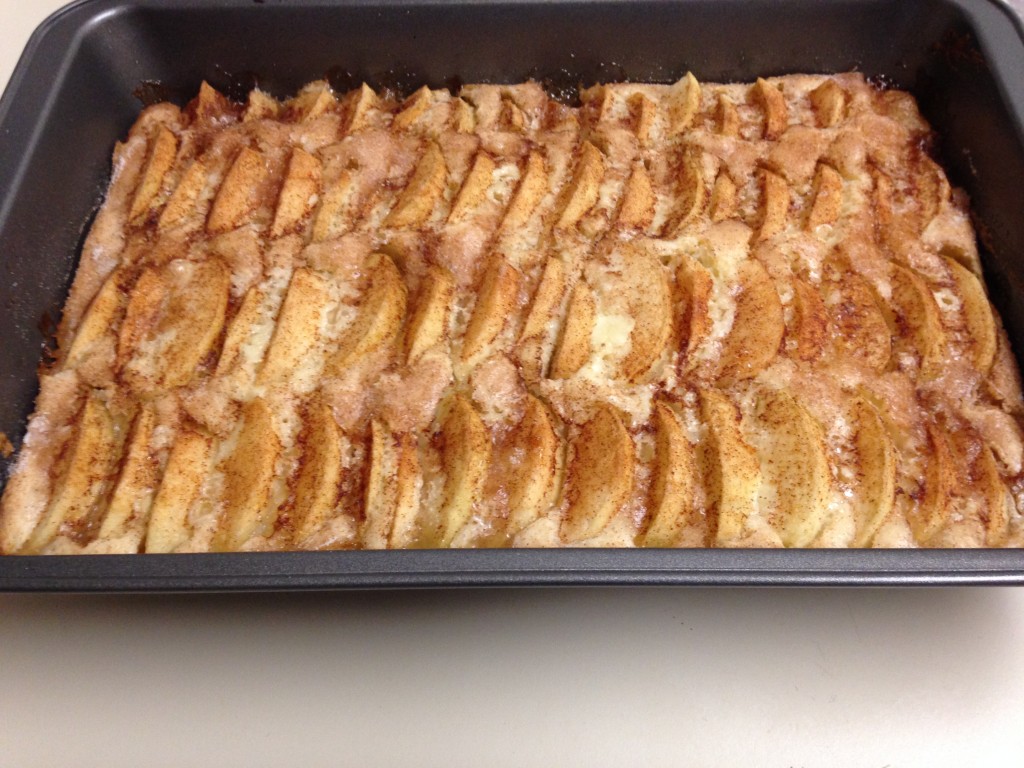Want to make history this Thanksgiving? Every Friday between now and Thanksgiving, we’ll be sharing a recipe from our collections that one of our staff members has found, prepared, and tasted. We’re excited to bring these recipes out of their archival boxes and into our kitchens (metaphorically, of course!), and we hope you’ll find some historical inspiration for your own Thanksgiving.
Happy Oktoberfest! To kick off our Rubenstein Library Test Kitchen series, I prepared a recipe to celebrate the German festival, which runs this year from September 20th to October 10th.
The Recipe and Duke History
I found a recipe for apple kuchen, or apple cake, in the Ted Minah Papers. The recipe was grouped with a series of recipes apparently intended for Duke’s Woman’s College, [1] ranging from barbecued meatballs to a lemon soufflé pudding. Although a sweet cake, interestingly, the recipe was labeled as a bread recipe rather than a dessert.
The recipe helped me learn more about some of the culinary history at Duke, especially about the influential Theodore W. “Ted” Minah. Minah was the director of Duke University Dining Halls from 1946 to 1974. By his retirement in 1974, Minah had transformed the dining halls at Duke University from a small operation to 12 dining halls serving approximately 15,000 meals each day.
The context for the recipe collection wasn’t clear – the ingredient proportions were for smaller portions, usually 4 to 6 servings. Since it was coming from the collection of the Dining Hall director, I expected the recipe to be scaled to serve large groups of students, but perhaps the recipes were designed for a Woman’s College cookbook? I’ve seen university-related cookbooks in other collections, like the “Culinary Casebooks” in the Duke Law Dames records (possibly a topic for a future “Rubenstein Library Test Kitchen” post!).
Like many older recipes, it was short and to the point – no lengthy descriptions of methods or ingredients to coddle the home cook. I did encounter an interesting culinary term I’d never seen before, but which continues to appear in other archival collections I’m processing: Oleo. Oleo was a common colloquial term used to refer to margarine, whose full name is oleomargarine. I admit that I strayed from the recipe and used butter rather than margarine, but that substitution didn’t seem to hurt the recipe.
The Results
As often happens in the archives, I learned a variety of interesting new facts that I would have never guessed I’d encounter – from the history of the university, to colloquial cooking terms!
Overall, the recipe was perfect for fall – the tart apples, cinnamon, and somewhat unusual cake batter made a tasty seasonal treat. The recipe was easy and quick to make, used common ingredients found in any grocery store, and should appeal to even the pickiest eater.

Rating: 4 out of 5 stars!
Stay tuned for more tasty recipes from our collections!
1. The Woman’s College was established at Duke in 1930 as a parallel to Trinity College for men. The Woman’s College fostered a community that allowed for shared university faculty, curriculum, and educational facilities with the men’s college, while giving women an opportunity for leadership through separate student government, social standards committees, and judicial board. The Woman’s College merged with Trinity College in 1972.
Post contributed by Patrick Dollar, Drill Intern, Duke University Archives.





Great post! You might consider using the Religion in North Carolina Digital Collection, which has been established through the Div School in collaboration with UNC and Wake Forest. We have a great deal of excellent North Carolina church cookbooks, including several from congregations near Duke. For example, Trinity Treats from Trinity Methodist Church, and Mission Cookery from Saint Luke’s Episcopal Church. Thanks again, and happy cooking!
This looks so yummy!
What interesting history.
Some say our eyes are a window into the soul maybe we could say our stomachs are a window into our souls!
Patrick, thank you for preserving our history & reminding us of it’s importance.
My mother, whose parents immigrated from Germany, made a similar cake using plums rather than apples. It was called Zwetschgenkuchen. It was wonderful!
Oooooh, we may have to try a plum version next summer! Thanks for reading, Ruth!